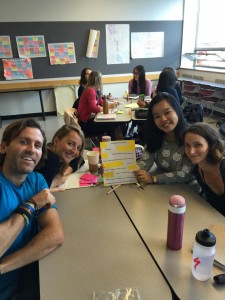Some Thoughts Before the Break
With winter break coming up and practicum finishing, I find myself and the rest of the IB cohort are working hard to make the most out of these last few weeks. We’ve been away from practicum for a while, and spend most of our time on university campus, strategizing different games and concepts to bring into our lesson plans. There’s also been discussion of our actions and demeanour towards students in our classrooms, and I’d like to share a couple of memorable ideas that I’ve tried to embody. Firstly, it’s imperative that a teacher use proper language, and secondly, that they use best judgement when considering what material to teach.
for a while, and spend most of our time on university campus, strategizing different games and concepts to bring into our lesson plans. There’s also been discussion of our actions and demeanour towards students in our classrooms, and I’d like to share a couple of memorable ideas that I’ve tried to embody. Firstly, it’s imperative that a teacher use proper language, and secondly, that they use best judgement when considering what material to teach.
As teachers, it’s our job to provide our students with proper vocabulary skills, and there is no better way than to mimic them ourselves. Using words like “class” instead of “guys” when addressing students can make a big difference, and sets a precedent that encourages equal opportunity for everyone.
Judgement is a chief component in building lesson plans; it should be used to help determine what to teach, and when things need to be changed. Having just finished a unit on Canadian government in my practicum, I felt propelled by judgement to bring up some current issues affecting other governments around the world. These issues weren’t part of our government, but they were associated with the Unit of Inquiry – How we organize ourselves, therefore my judgement deemed it necessary to accompany these events into the lesson.
I will continue to use my best judgement to determine whether lessons need changing, and I’m trying to be more conscious of my choice in words; I hope you can too!
Thanks for reading,
Chris

You are right, Chris. As teachers, we have a major impact on our students. They notice everything – what we say, what we do, how we dress, and even what we eat! We are role models in every sense of the word. I would like to know more about the differences you noticed when you changed how you addressed the students. Did it impact your classroom management? In terms of judgement, I wonder if you could expand on this? As our curriculum is mandated by the provincial government and our IB Essential Elements are mandated by the IBO, is judgement the main component when developing lesson plans? What should our main considerations be? I look forward to hearing your ideas.
Thanks for your post, Meredith. In regards to my use of language, I have noticed that it has changed the way I perceive my relationship with students. I feel more authoritative and it strengthens my role as ‘teacher’ instead of ‘friend’.
In terms of judgement, I believe it is necessary to use when there is discrepancy between effective teachings and the mandated curriculum. There must be a balance, so if for example, a child cannot learn from the material presented to me by the curriculum, then I must change it to suit his/her needs.
Many considerations must be made while teaching, there are an unlimited combinations of ways to go about a lesson, but the priority is students. As teachers, our main consideration should be to ask ourselves “how do my students learn best?” and then appropriate the lesson from there.
Thanks,
Chris
Thanks Chris. What about the link to IB? How did you or could you bring in IB to your unit on government?
Meredith,
IB is the shape of our lessons; it is the base for how we plan our teachings. In the unit of government for example, I would have begun with a motivation like pictures related to government, to build their inquiry. We would make a wonder wall to give myself and the students an understanding of their existing knowledge. Afterward, we would move into the unit, framed by learner profile traits. I might use traits such as ‘Communicators’ and ‘Principled’ because of the inherent collaboration and fairness required to running a government, and then have students form into groups where they would build their own governments. During this process, I would use IB attitudes to reinforce positive behaviors and effective work time. I might do this by addressing the students that I see using different attitudes, and writing their names on the board.
IB really comes into play during every lesson, and it acts as the framework that teachers use to determine whether their lesson is effective. To provide another example, during the unit of government I would employ the IB approaches to learning and concepts to see if my lessons were addressing the students needs. I would check to ensure the government group work was encouraging their communication skills by looking at their body language, expressions and journal reflections.
Thanks,
Chris